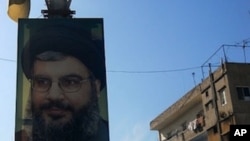The leader of Hezbollah said Sunday that evidence allegedly being held by U.N. investigators claiming his militant group is responsible for the death of a former Lebanese prime minister is insignificant.
Thousands of Lebanese students cheered as Hassan Nasrallah, the leader of the Shi'ite political party and militant group Hezbollah appeared on a large TV screen, aired on Al-Manar, a Hezbollah television station.
Nasrallah accuses Israel of invading Lebanese telecommunications. He says Lebanese phones are being tapped and traced. Israel, he says, could have used this technology to frame Hezbollah for the 2005 assassination of Prime Minister Rafik Hariri.
The Netherlands-based tribunal investigating the 2005 killing of Rafik Hariri has kept silent on possible suspects. But, several media reports, including the Canadian Broadcasting Corporation's report last week, said the court will indict Hezbollah members based mainly on the analysis of mobile phone calls in the run-up to Hariri's assassination.
Through leaked documents and interviews, the report details a cell phone investigation that suggests an eight-man Hezbollah-backed team assassinated the leader, aided by the chief of Lebanese police intelligence, Wissam al-Hassan.
The U.N. court quickly released a statement, condemning the broadcaster's report, saying it "endangered lives."
The U.N. tribunal set up to prosecute Hariri's killers has caused deep divisions within Lebanon's government, which includes Hezbollah along with pro-Western blocs led by Prime Minister Saad Hariri, the son of the slain leader.
Hariri's assassination in a truck bombing has transformed Lebanon and the country's relationship with its larger neighbor, Syria, which is a main supporter of the Shiite Hezbollah. Immediately after the killing, suspicion fell on Damascus, which led to massive protests that ended Syria's nearly 30-year military presence and domination in Lebanon.
But Hezbollah still remains a powerful political party in Lebanon, allied with nearly half the parliament. Alain Aoun, a member of Parliament and the March 8 Alliance, a political coalition that includes Hezbollah, says the court is a political tool designed to discredit Hezbollah. "Many people fear that the STL is part of these tools that are being used to target Hezbollah politically, rather than really [bringing] up truth. I think this will trigger a reaction in Lebanon," he said.
Indictments of Hezbollah members are expected before the end of the year, and Nasrallah has vowed to "cut the hand" of any one who tries to arrest members. The court has ruled that it can try suspects in absentia.
And as Lebanon braces itself for the indictments, some people are worried they could lead to riots or sectarian battles. Others say that after 15 years of civil war, the Israeli occupation, and a 2006 war between Israel and Hezbollah, Lebanese people are tired of violence.
Mirna el-Helou, a dietitian at a Beirut health-food store, says even though Lebanon has a long history of sectarian strife, she thinks the country can pull though this political crisis peacefully. "Maybe the youth now are more knowledgeable about being open to others, and I don't think there is going to be any conflicts on the roads," she said.
In recent weeks, Lebanese leaders have called for negotiations and vowed that indictments of Hezbollah members will not cause Lebanon to once again erupt in violence.
Hezbollah Discounts Reports of Involvment in Lebanese Leader's Death





